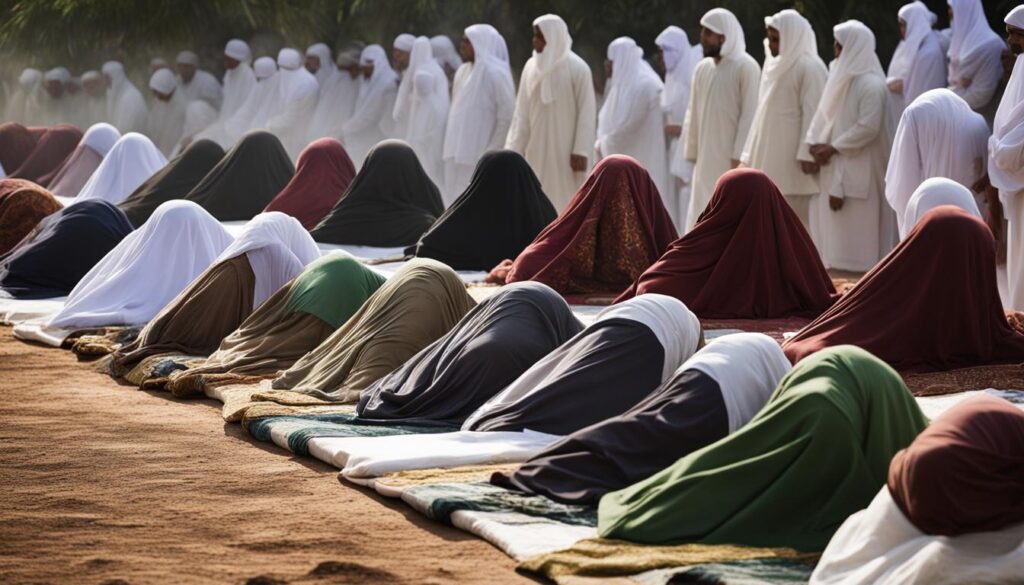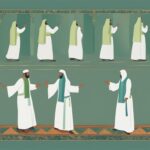When it comes to the janaza (funeral) prayer, there are specific guidelines and supplications that hold great importance. This prayer, which is considered a communal obligation, is performed while standing, without any bowing or prostration. It can be conducted by a group of people on behalf of the deceased and can take place at any time, except during sunrise and sunset.
The designated individual leads the janaza prayer, and it is recommended to include specific supplications after each takbir. While there is no fixed formula for the du’a to be made during the prayer, various supplications from the Prophet Muhammad and his companions are accepted. It is believed that the reward for performing the janaza prayer and attending the burial is as immense as the size of Mount Uhud.
Key Takeaways:
- Janaza prayer is performed while standing, without bowing or prostration.
- The prayer is considered a communal obligation and can be conducted by a group.
- Specific supplications can be added after each takbir.
- Various supplications from the Prophet Muhammad and his companions are acceptable.
- The reward for performing janaza prayer is said to be equivalent to the size of Mount Uhud.
The Rituals of Janaza – Washing and Shrouding the Deceased
After a Muslim passes away, there are specific rituals that are performed on the deceased. These include al-ghusul (washing) and al-kafan (shrouding). The washing is done in a specific order, with three washes of the entire body using clean water and soap. After the washing, the body is dried and wrapped in a simple white shroud made of three pieces of cloth. It is recommended to recite supplications during the washing and shrouding process, asking for forgiveness and mercy for the deceased. The rituals of washing and shrouding are considered acts of kindness and respect towards the deceased.
“Washing and shrouding the deceased is a sacred duty that allows us to show our love and respect for the departed. Through this ritual, we not only cleanse the body but also purify the soul, readying it for the final journey. It is a humbling experience that reminds us of our own mortality and the importance of preparing for the hereafter. Let us approach this task with utmost care and dedication, honoring the deceased and seeking forgiveness on their behalf.”
The Ritual of Washing the Deceased
The washing of the deceased is a solemn and delicate process that requires utmost care and reverence. It is recommended to begin by covering the body’s private parts with a cloth and then washing the right side first, followed by the left side. The body should be washed three times, using clean water and mild soap. While washing, it is important to recite supplications and seek forgiveness for the deceased. After the washing, the body should be dried gently and wrapped in a clean white shroud.
The Ritual of Shrouding the Deceased
Shrouding the deceased is an act of honoring and dignifying the body. The shroud should be made of three simple pieces of cloth, free from any adornments or designs. The shroud is wrapped around the body, starting with the right side, then the left, and finally the head. It is a symbolic gesture of returning to the earth in a state of simplicity and humility. The act of shrouding is accompanied by supplications, asking for the mercy and forgiveness of Allah for the departed soul.
By performing the rituals of washing and shrouding the deceased with sincerity and devotion, we not only fulfill our religious duty but also express our love and respect for the departed. These rituals remind us of the fragile nature of life and the need to prepare ourselves for the inevitable journey towards the hereafter. Let us approach this sacred task with humility and reverence, seeking the forgiveness and mercy of Allah for the deceased.

| Benefits of Washing and Shrouding the Deceased | Supplications during Washing and Shrouding |
|---|---|
| 1. Purifies the body and soul of the deceased. | 1. Seek forgiveness and mercy for the deceased. |
| 2. Honors and dignifies the deceased. | 2. Pray for the deceased’s entry into Paradise. |
| 3. Provides closure and solace to the bereaved. | 3. Express gratitude for the deceased’s role in our lives. |
The Janaza Prayer – Steps and Supplications
When performing the janaza (funeral) prayer, there are specific steps and supplications that should be followed. The janaza prayer consists of four takbirs (saying Allahu Akbar) and specific supplications made after each takbir. While it is recommended to raise the hands during the first takbir, it is not mandatory for the rest. The supplications after the takbir can be chosen from various authentic sources, including the Quran and the Sunnah.
Some common supplications during the janaza prayer include praising Allah, seeking forgiveness for the deceased, and asking for protection from the trials of the grave and the torment of Hellfire. These supplications can be heartfelt prayers for the deceased, seeking mercy and forgiveness from Allah. The prayer concludes with the recitation of salam (peace) once, both by the imam leading the prayer and the followers. By following the steps of the janaza prayer and making the appropriate supplications, believers fulfill their obligation to pray for the deceased and honor their memory.
Performing the janaza prayer is not only a way to remember the deceased but also a reminder of the temporary nature of life. It is an opportunity for believers to reflect on their own mortality and the importance of preparing for the hereafter. Through the janaza prayer, believers seek Allah’s mercy and forgiveness not only for the deceased but also for themselves, as we all hope for forgiveness and salvation in the afterlife. The janaza prayer is a solemn and significant act of worship that serves as a means of solace for the grieving and a source of blessings and reward for believers.
| Steps of the Janaza Prayer: | Supplications during the Janaza Prayer: |
|---|---|
| 1. Stand facing the qibla (direction of prayer) | 1. Takbir (saying Allahu Akbar) – Raise hands |
| 2. Intention – Make the intention to pray the janaza prayer | 2. Recite Ta’awwudh (Seeking refuge in Allah from Satan) |
| 3. Takbir – Raise hands and say Allahu Akbar | 3. Recite Surah Al-Fatihah (The Opening) |
| 4. Recite Surah Al-Fatihah (The Opening) | 4. Make additional supplications for the deceased |
| 5. Make supplications for the deceased | |
| 6. Takbir – Raise hands and say Allahu Akbar | |
| 7. Make supplications for the deceased | |
| 8. Takbir – Raise hands and say Allahu Akbar | |
| 9. Make supplications for the deceased | |
| 10. Takbir – Raise hands and say Allahu Akbar | |
| 11. Make supplications for the deceased | |
| 12. Recite salam (peace) once |
The Burial Process – Dafin and Cemetery Etiquette
Once the janaza prayer is completed, the deceased is taken for burial. The burial process, known as al-dafin, involves placing the body in the grave and covering it with soil. It is a solemn moment that requires the utmost respect and dignity.
During the burial, it is important to handle the body carefully and with reverence. The body should be placed in the grave gently and without haste. This act symbolizes the final resting place of the deceased, and it is crucial to carry out this task with utmost care and attention.
After the burial, it is recommended to visit the cemetery and make supplications for the deceased and all the believers buried there. This act of remembrance and prayer shows respect for the deceased and invokes blessings upon them. It also serves as a reminder of the temporary nature of life and the importance of preparing for the hereafter.
When visiting the cemetery, it is important to observe proper etiquette. This includes maintaining a quiet demeanor, refraining from engaging in inappropriate behavior, and showing respect for the resting place of the deceased. By adhering to these etiquettes, believers can honor the memory of the deceased and seek Allah’s mercy and forgiveness for them.
| Cemetery Etiquette | Description |
|---|---|
| Be Quiet | Speak softly and avoid making unnecessary noise. The cemetery is a place of peace and reflection. |
| Show Respect | Treat the cemetery with reverence and avoid any disrespectful or inappropriate behavior. |
| Follow Dress Code | Dress modestly and respectfully when visiting the cemetery. |
| Be Mindful of Others | Be considerate of other visitors and their grieving process. Give them space and privacy. |
| Leave No Trace | Dispose of any rubbish responsibly and leave the cemetery clean and tidy. |
“The cemetery is a place of solemnity and remembrance. It is essential to approach it with a humble heart and a deep sense of reverence. Let us honor the deceased by showing respect and offering prayers for their eternal peace and salvation.” – Imam Ahmad
The Importance of Cemetery Etiquette
Observing proper cemetery etiquette is not just a sign of respect for the deceased, but it also demonstrates our understanding of the sanctity and significance of the final resting place. By being mindful of others, maintaining a quiet atmosphere, and showing respect for the cemetery, we can honor the memory of the deceased and create a peaceful environment for contemplation and prayer.
Conclusion
The supplication for janaza is a sacred practice within Islamic funeral rituals, serving as a means for believers to express their respect for the deceased and seek Allah’s mercy and forgiveness. This essential part of the burial process allows individuals to fulfill their duty in praying for the departed and offering solace to grieving families.
By adhering to the guidelines and steps of the janaza prayer, believers can honor the deceased and demonstrate their devotion. From the rituals of washing and shrouding the deceased to the recitation of specific supplications during the funeral prayer, every action serves as a way to seek Allah’s blessings and intercede for the departed soul.
The Islamic burial process, encompassing the janaza supplication and the proper conduct during the burial, reminds us of the transient nature of life and the journey towards the afterlife. It is a testament to the importance of showing reverence for the deceased and seeking Allah’s mercy and forgiveness for them.
May Allah grant all the deceased believers an honorable place in Jannah (Paradise) and provide comfort and strength to their loved ones left behind. Let us continue to perform the supplication for janaza and fulfill our obligation to seek Allah’s mercy for those who have departed.
FAQ
What is the janaza prayer?
The janaza prayer is a prayer performed for the deceased in the Islamic tradition.
Is the janaza prayer obligatory?
The janaza prayer is considered a communal obligation, meaning it can be performed by a group of people on behalf of the deceased.
When can the janaza prayer be performed?
The janaza prayer can be performed at any time, except during sunrise and sunset.
Who leads the janaza prayer?
The janaza prayer is led by the individual who has been designated by the deceased.
What supplications should be made during the janaza prayer?
There is no specific formula for the supplications, but various supplications from the Prophet Muhammad and his companions are acceptable.
What are the rituals performed on the deceased after death?
The rituals include al-ghusul (washing) and al-kafan (shrouding).
How should the body be washed?
The body should be washed in a specific order, with three washes of the entire body using clean water and soap.
What is the shroud made of?
The body is wrapped in a simple white shroud made of three pieces of cloth.
What is the purpose of the janaza prayer?
The janaza prayer is a way to seek Allah’s mercy and forgiveness for the deceased.
What are the steps of the janaza prayer?
The janaza prayer consists of four takbirs (saying Allahu Akbar) and specific supplications made after each takbir.
What is the burial process?
The burial process, known as al-dafin, involves placing the body in the grave and covering it with soil.
Are there any etiquettes to follow at the cemetery?
It is important to be quiet and respectful at the cemetery, avoiding any inappropriate behavior.









